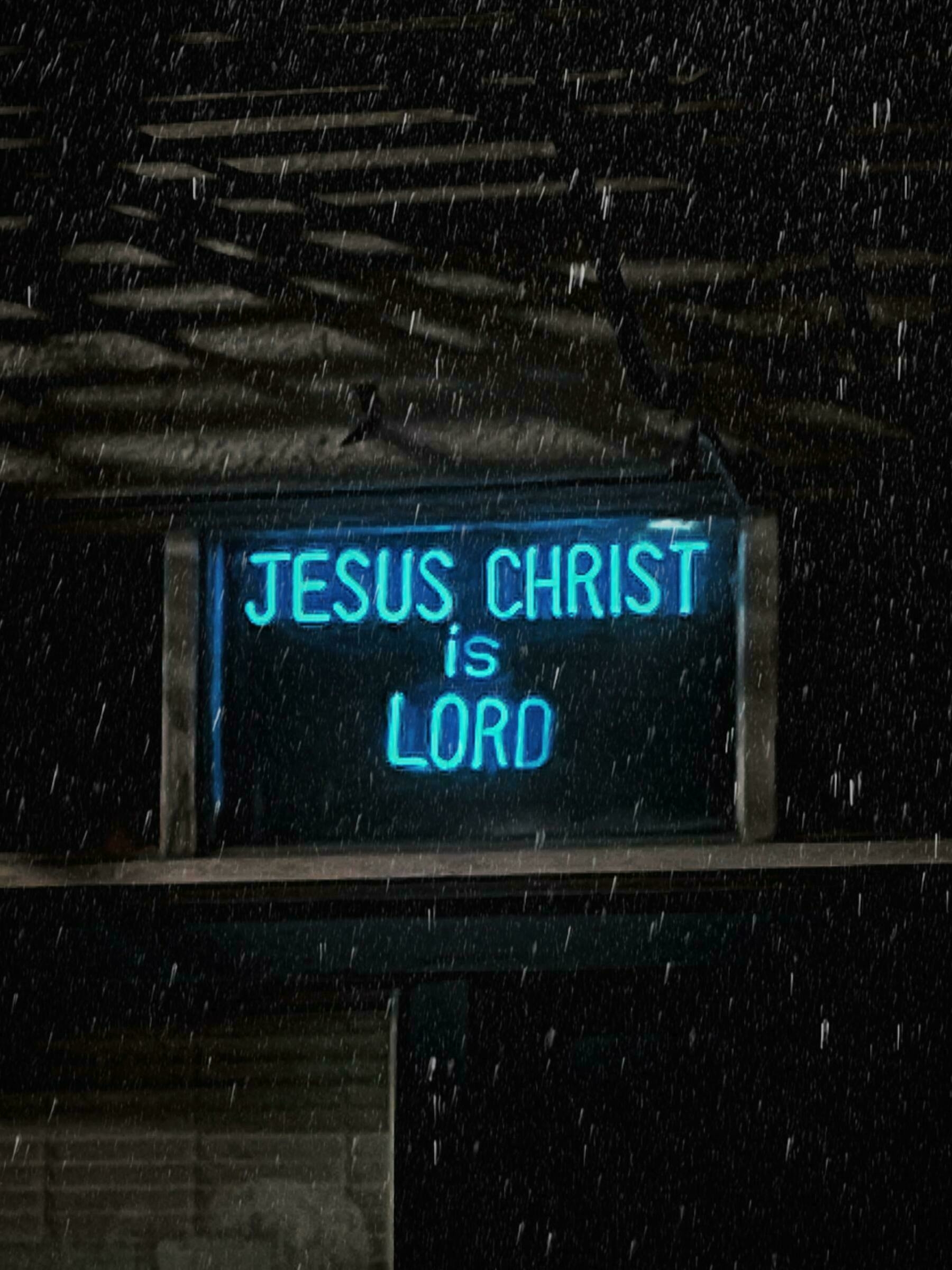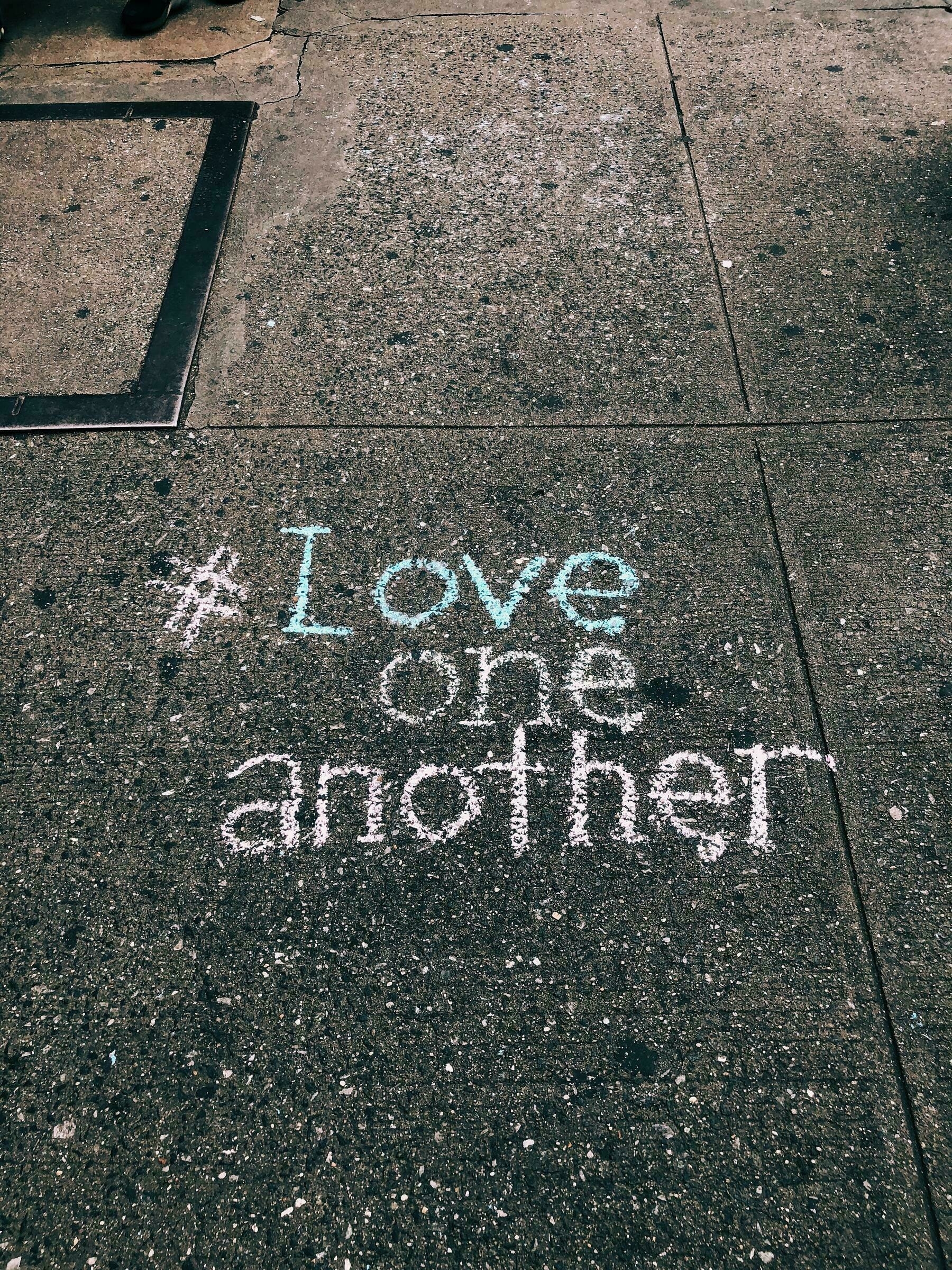2021
They Didn't Notice
John 1:9-13

The Life-Light was the real thing:Every person entering Life he brings into Light. He was in the world, the world was there through him, and yet the world didn’t even notice. He came to his own people, but they didn’t want him. But whoever did want him, who believed he was who he claimed and would do what he said, He made to be their true selves, their child-of-God selves. These are the God-begotten, not blood-begotten, not flesh-begotten, not sex-begotten.
There are times that I can’t get one of the readings out of my head and I keep thinking about it. This passage has been one of those.
At Doubt on Tap the other night there was a conversation, that happened before most folks showed up, about how amazing people are. There are so many kind men and women in the world. Every single day there are people acting out in beautiful ways.
Have you ever really thought about that?
I mean seriously.
Have you ever really considered that the vast majority of people out in this world are doing good and beautiful things every single day?
We don’t notice it though.
That might be one of the hardest lessons of the Advent season and one of the saddest things in this poem from John. Nobody really noticed that the Christ had come into the world.
This hard thing and sad thing is also something that brings me some hope.
Why?
Because it means that when we do good we don’t need the addualtion or congratulation of the world. When we go about loving well and nobody notices we can take joy in being able to identify even more deeply with Christ.
This holiday season when you love well and nobody notices, count it all joy!
The Christ entered the world and the world didn’t even notice, so it’s OK if the world doesn’t notice us either.
Let us love well for the sake of loving well.
After all, isn’t living that way what helps us become our true selves, our child-of-God selves?
True Selves
John 1:9-13

The Life-Light was the real thing:Every person entering Life he brings into Light. He was in the world, the world was there through him, and yet the world didn’t even notice. He came to his own people, but they didn’t want him. But whoever did want him, who believed he was who he claimed and would do what he said, He made to be their true selves, their child-of-God selves. These are the God-begotten, not blood-begotten, not flesh-begotten, not sex-begotten.
I have a confession to make. Over the years I have begun to think that there is more to this whole following Christ thing than simply being able to “go to heaven” when I die.
For a long time that seemed to be the thing about following Christ. I can’t even count the number of conversations that I have had with people about becoming a Christian. Many of those conversations centered around the need to receive Christ so that the person would go to heaven. In my evangelism, for many years, the issue of eternal destiny was really all that mattered.
As I read the gospels more and more I am beginning to think that I have missed the mark. There is so much more to following Christ than eternal fire insurance.
Did you catch this little bit in the poem from John,
But whoever did want him, who believed he was who he claimed and would do what he said, He made to be their true selves, their child-of-God selves.
As I continue to live this Christ-following life I am learning that this is really the central part of following Christ. This whole “…made to be their true selves, their child-of-God selves,” is really what it’s all about.
When we think that following Christ is only about eternity we miss out on the here and now of a life of faith and spirituality. Christ’s work of reconciliation I have often only thought of as something rooted in our eternal destiny. That is simply not the case. The reconciliation that Christ has wrought through his life, death, resurrection, and ascension is to make us our true selves.
The reconciling work of Christ is a reconciliation of all things. This includes reconciling ourselves. In Christ we are able to finally become who we really and truly are.
Perhaps this is something that you’ve thought about before, but for me, it’s still in that whole “revolutionary” realm of thinking. I feel a bit dumbstruck by the ramifications of this truth.
God is not simply concerned with my eternal destiny. No, God wants me and you to become the best versions of ourselves right here and right now!
I think this is why we need to be in community and live life with one another. Because it is in the context of other child-of-God selves that we are challenged to become more loving, gracious, and kind. In other words, in the midst of deep community we have the best opportunity to become the best or fully reconciled versions of ourselves.
Jesus Is Lord
1 Corinthians 12:1-3

Today is special Knee Jerk Devotional! Instead of a written one devotional I recorded my sermon from this Sunday because many asked for it. You can find it at the Knee Jerk Devotional Podcast or my YouTube channel. The links are at the top of the email.
Never fear, my short attention friends, tomorrow we will back to normal!
Guides
John 1:6-8

There once was a man, his name John, sent by God to point out the way to the Life-Light. He came to show everyone where to look, who to believe in. John was not himself the Light; he was there to show the way to the Light. — John 1:6-8, The Message
In my profession there is a temptation that is strong. Really strong. That temptation is to see myself as “The Light.” It’s wild to think about how easily we become deluded by our own sense of greatness. If us pastors are honest, we know that there are more than a few of us that struggle with this delusion.
There are have been many notable religious leaders who have fallen from faith. I would venture to guess almost all of them share two things in common. One, deep down they believe that they are indeed the light. Two, they had isolated themselves from any kind of accountability and community.
Perhaps I am making too much of this. But, the longer I do this pastor thing and read the stories of those who fall and lose their way the more I think that these two things are true. The natural question is, what comes first the sense of grandeur or the isolation? I am guessing it is a chicken and egg situation. In many seminaries budding pastors are taught that you cannot be close friends with your congregants and Elders. This of course leads to isolation. Pastors also have a clear sense of calling and many take this sense of calling as being of divine origin. Unfortunately, this is something that bleeds over into every aspect of their leadership. So in their minds, if you challenge them then you are challenging God.
This kind of thinking has lead to much spiritual abuse and harm in many local churches. It’s heartbreaking to think about how many have been deeply wounded by pastors who have come to the conclusion that they are The Light as opposed to simply pointing people to The Light.
Pastors, we have to do better.
We need to learn from John the Baptist.
We need to remember that our calling is to be people who, “point out the way to the Life-Light.” If we can remember that we are pointing out the way to the Life-Light then we will remember the proper ordering of things. We are not The Light. We are guides. If we are guides then we too are on the way. We have not arrived, we are simply people who have a map and a flashlight.
Life-Light!
John 1:1-5

The Word was first,
the Word present to God,
God present to the Word.
The Word was God,
in readiness for God from day one.
Everything was created through him;
nothing—not one thing!—
came into being without him.
What came into existence was Life,
and the Life was Light to live by.
The Life-Light blazed out of the darkness;
the darkness couldn't put it out. — John1:1-5
“What came into existence was Life.”
This is a marvelous phrase.
“Life-Light blazed out of the darkness; the darkness couldn’t put it out.”
Another beautiful turn of phrase.
When you think about Jesus do you think about a blazing Life-Light that destroys the darkness?
Christ lights up the darkness.
There is something unconquerable about the Life-Light. No matter how hard we may try there is no dousing it.
The Life-Light overwhelms all that it touches.
When you come face to face with embodied grace you can’t help but be transformed.
We have all been around people who seem to be void of light. These are the dour people. Those who seem to have a shadow about them all the time. They are the Christmas Eve Scrooge’s of our lives. A coarse or negative word is always on their lips. There is only darkness for these people.
We have also been around those who are full of Light-Life. There is a joy that exudes from the fiber of their beings. They can’t help but smile and laugh. Light emanates from the core of their being. These are the Christmas morning Ebenezer’s of our lives.
If we look around and see darkness all around us, we must ask ourselves, “Will I be the light?”
Oh for those that claim to follow Christ to choose to be light in the world! We could light up the world, couldn’t we?
How are you moving in the world? Are you a bearer of darkness or light?
Salty?
Colossians 4:2-6

Pray diligently. Stay alert, with your eyes wide open in gratitude. Don't forget to pray for us, that God will open doors for telling the mystery of Christ, even while I'm locked up in this jail. Pray that every time I open my mouth I'll be able to make Christ plain as day to them.
Use your heads as you live and work among outsiders. Don't miss a trick. Make the most of every opportunity. Be gracious in your speech. The goal is to bring out the best in others in a conversation, not put them down, not cut them out. — Colossians 4:2-6, The Message
As Paul comes to the end of this little letter to the church at Colosse, he encourages them to pray, to pay attention to the world with gratitude, and to bring out the best in others in a conversation.
This morning I have been thinking about Doubt on Tap tonight. Our conversation topic is going to be about why our current crises have caused division as opposed to bringing us together. I am struck that this bit about bringing out the best in others in a conversation has something to say in the matter.
I wonder, do those of us who seek to follow Christ have this as our goal?
In the more literal translations like the NRSV or the NIV we see the translation, “so that you may know how you ought to answer everyone.” This is tied to the statement of, “Let your speech always be gracious, seasoned with salt.”
I think that Peterson gets to the heart of it. He allows the imagery of seasoned with salt have its full way with what Paul was writing. Properly salted food tastes its best when compared to under salted or over salted food.
In our day it seems that we Christians tend to over salt or under salt and as a result we spoil everything. The under salt folks don’t want to say anything that might make someone uncomfortable. These are the folks that if you have a booger hanging out of your nose would politely ignore it. The over salt folks, don’t care about bringing out the best in another, all they care about is winning. These are the people who would point and yell at the top of their lungs, “Hey look, Johnny has a giant booger hanging out his nose!” Then there are those trying to properly salt the conversation. They are willing to engage fully. They speak truthfully but lovingly. They listen and seek to understand more so than just simply winning a conversation. These people would gently come up to you and whisper in your ear, “My friend, you have a booger hanging out of your nose.”
When we lose the goal, the flourishing of our neighbor, then we have lost our way. If we lose the way, then we have in a very real sense lost Christ. Christ never loses us. Christ is always right there with us, but in our desire to not make waves or to simply win, we lose sight of Christ.
Tonight, I am going to be more intentional about trying to bring the best out of my conversation partners. I hope that I can grow in this area of my life. I desperately want to be a person who helps others flourish. How about you?
Not That!
Colossians 3:17-4:1

Let every detail in your lives—words, actions, whatever—be done in the name of the Master, Jesus, thanking God the Father every step of the way.
Wives, understand and support your husbands by submitting to them in ways that honor the Master.
Husbands, go all out in love for your wives. Don't take advantage of them.
Children, do what your parents tell you. This delights the Master no end.
Parents, don't come down too hard on your children or you'll crush their spirits.
Servants, do what you're told by your earthly masters. And don't just do the minimum that will get you by. Do your best. Work from the heart for your real Master, for God, confident that you'll get paid in full when you come into your inheritance. Keep in mind always that the ultimate Master you're serving is Christ. The sullen servant who does shoddy work will be held responsible. Being Christian doesn't cover up bad work.
And masters, treat your servants considerately. Be fair with them. Don't forget for a minute that you, too, serve a Master—God in heaven. — Colossians 3:17-4:1
Have you found yourself uncomfortable with the “submission” language of the New Testament when it relates to household codes and the like? It’s something that has become a bit of a hot button issue for many in our society. This whole “wives submit” thing sure feels out of date, doesn’t it? This passage also includes the equally uncomfortable stuff about servants submitting to their masters.
The easy thing for me to do is to try and ignore the passage or to try and couch the uncomfortable passages into the more comfortable passages (husbands love your wives and masters care for your servants). I have done this often and I think that it is helpful to consider the whole of the context. It is fascinating to think about Paul’s instructions to the husbands, parents, and masters, who held power over wives, children, and servants in his culture. Why? Because he is subversively countering the culture by calling them to something different. There is no “power over” for the Christian. There is empowering or power alongside within the Christian economy. This is crucial and not to be missed.
I was reading a thought by another Christian leader, David Fitch, the other day about this whole submission thing. I thought it was intriguing and something that I really resonated with. So, in light of today’s reading, I drop it here for you.
THE MEANING OF THE WORD 'SUBMISSION' ...
...has been undermined, even destroyed, by patriarchalists in the church. It has been used to underwrite abuse and coercion. It has been used by leaders to 'lord it over' and gain compliance. But it actually describes what leaders do in the NT, versus what they demand of their followers..
In the NT, my argument is, it is the leader who submits. It is the act of 'submission' that initiates. When I propose something and then say to the group (or other leaders) "I submit this to you," I start the process of discernment into motion. To me that is leadership. We work towards the Spirit's movement then by mutually submitting, listening to every voice, learning and arriving at an agreement in the Spirit.
These principles are exhibited in Mark 10:42-45; Rom 12:3-8 and many other places.
In Eph 5:21, the general principle appears : "submit yourselves one to another out of reverence for Christ." Then Paul recites the household codes. He starts with marriage saying "wives submit to your husbands." Ironically I can't help but see this as putting the wife in the position of leadership. They go first and then are followed by "husbands die for your wives." So the fact that the women go first does not reflect a hierarchy in which women are under husbands, it reflects this revolutionary (bottom up) leadership dynamic that runs throughout the kingdom. The leader leads by submitting him/herself to the other, from which mutuality is returned.
With that being said, I think we have to understand all this in the context of, “Let every detail in your lives—words, actions, whatever—be done in the name of the Master, Jesus, thanking God the Father every step of the way.”
It seems to me that if we were living this way, then so many of these things become moot points. We will naturally love the other in an acts of mutual submission. There will be a constant desire to practice love through caring for the other. If we could live our lives as though every person we interacted with was Christ, then all these things that Paul talks about here and in other places become secondhand.
Oh let us practice love! Let us be a people who chooses not to leverage power over but seeks to empower the other.
One Another
Colossians 3:15-17

Let the peace of Christ keep you in tune with each other, in step with each other. None of this going off and doing your own thing. And cultivate thankfulness. Let the Word of Christ—the Message—have the run of the house. Give it plenty of room in your lives. Instruct and direct one another using good common sense. And sing, sing your hearts out to God! Let every detail in your lives—words, actions, whatever—be done in the name of the Master, Jesus, thanking God the Father every step of the way. — Colossians 3:15-17, The Message
I love this image of the peace of Christ keeping us in tune with each other. It is this reminder of the one-anotherness of living in the way of Christ.
We live in a world where “going off and doing your own thing” is of the highest value. Yet, in the way of Christ, it is of little to no value. We are a people, a family, a one-another.
In my background there was this line of thinking that we could pursue a “just-me-and-Jesus” kind of spirituality. But, that is just not simply who we are or what we are called to. If we are going to try and follow Jesus in our lives then we need others with us. We need community. We need one another.
We are a one-another.
It is within this context that everything else connects here. We are to cultivate thankfulness. Have you ever thought about that word, “cultivate”? It means to “prepare and use” or “acquire or develop.” Thankfulness is not something that we come by naturally. We have to work at it. We must cultivate it in our lives. I love that it is couched here in the context of our one-anotherness because I have found that when I am deeply connected in community I am much more thankful.
It is in our one-anotherness that we speak gospel to each other. It is in our one-anotherness that we give it room to grow and develop and have its way.
The beauty of the gospel is that it grows in us. We don’t make some intellectual ascent and then BOOM!!! we are just like Jesus. No, we need a community of one-another to remind us of grace, mercy, compassion, and to love well.
Do you have your one-another community or are you trying to live this life isolated and alone?
Let Us Lament
Psalm 77

Lamenting is not something that we like to do. Lamenting is not something that comes naturally to us. But, when we are faced with a pain, a grief, a heartache that reaches into our soul, it is what we must do.
C.S. Lewis wrote in The Problem of Pain, “God whispers to us in our pleasures, speaks in our conscience, but shouts in our pains; it is His megaphone to rouse a deaf world.”
Every once in a while you come face to face with a brokenness that overwhelms you. It seems that lately this has been the case more than not. I look around and people are not being healed, they are losing jobs, they are experiencing death.
This all sucks.
I know, I know, I’m a pastor and my Mimi would be mad that I just used the “s-word.” But, you know what, it does suck.
That’s the truth of the matter.
The brokenness of this world is overwhelming at times. I am so mad and frustrated with it. I wish God would simply do what I want him to do. When I pray for him to heal someone, I want him to do that. When I ask him to save a marriage, I want him to do that. Every once in a while, I want him to supersede the secondary causes of human sin, frailty, and brokenness to make this world how I want it.
He’s sovereign and good I remind myself. But, dang it sure does not feel that way at times. Not even a little. I don’t really doubt his goodness, but there are times when I wonder if he really does have control of this ball of dust.
Intellectually, I know he does.
Intellectually, I know that everything has purpose.
Today, as I drink my coffee, it doesn’t feel like it at all.
Emails, phone calls, texts, Facebook statuses, they all point to something else.
Even now, I am thinking about all the times God has responded. All the times when it made no sense for something to happen apart from God’s miraculous intervention. That makes me smile.
A few years ago my son said, “Dad, if I need something important to happen, I am asking the church to pray. God listens to our church and does stuff.”
It doesn’t feel that way this morning. But, I know it to be true. Me and God have history. But, I have a short memory.
“When my heart was grieved and
my spirit embittered,
I was senseless and ignorant;
I was a brute beast before you.
Yet I am always with you;
you hold me by my right hand.
You guide me with your counsel,
and afterward you will take me into glory.
Whom have I in heaven but you?
And earth has nothing I desire besides you.
My flesh and my heart may fail,
but God is the strength of my heart
and my portion forever.” Psalm 73:21–26
I am still in the, “I was senseless and ignorant” stage. I am working my way toward the “Whom have I in heaven but you?” stage.
Even so, God can handle me saying, “This sucks.”
As you can probably tell, when I need to lament, I turn to the Psalms. More and more of that time is spent in Eugene Peterson’s, The Message. He gives words to my soul. Today it is Psalm 77 and it’s all I got.
I yell out to my God,
I yell with all my might,
I yell at the top of my lungs.
He listens.
I found myself in trouble
and went looking for my Lord;
my life was an open wound that wouldn’t heal.
When friends said,
“Everything will turn out all right,”
I didn’t believe a word they said.
I remember God — and shake my head.
I bow my head — then wring my hands.
I’m awake all night — not a wink of sleep;
I can’t even say what’s bothering me.
I go over the days one by one,
I ponder the years gone by.
I strum my lute all through the night,
wondering how to get my life together.
Will the Lord walk off and leave us for good?
Will he never smile again?
Is his love worn threadbare?
Has his salvation promise burned out?
Has God forgotten his manners?
Has he angrily stalked off and left us?
“Just my luck,” I said.
“The High God goes out of business just the moment I need him.”
Once again I’ll go over what GOD has done,
lay out on the table the ancient wonders;
I’ll ponder all the things you’ve accomplished,
and give a long, loving look at your acts.
O God!
Your way is holy!
No god is great like God!
You’re the God who makes things happen;
you showed everyone what you can do —
You pulled your people out of the worst kind of trouble,
rescued the children of Jacob and Joseph.
Ocean saw you in action, God,
saw you and trembled with fear;
Deep Ocean was scared to death.
Clouds belched buckets of rain,
Sky exploded with thunder,
your arrows flashing this way and that.
From Whirlwind came your thundering voice,
Lightning exposed the world,
Earth reeled and rocked.
You strode right through Ocean,
walked straight through roaring Ocean,
but nobody saw you come or go.
Hidden in the hands of Moses and Aaron,
You led your people like a flock of sheep." (Psalm 77, The Message)
Dress Up
Colossians 3:12-14

So, chosen by God for this new life of love, dress in the wardrobe God picked out for you: compassion, kindness, humility, quiet strength, discipline. Be even-tempered, content with second place, quick to forgive an offense. Forgive as quickly and completely as the Master forgave you. And regardless of what else you put on, wear love. It's your basic, all-purpose garment. Never be without it. — Colossians 3:12-14, The Message
I hope you had a wonderful holiday! Thanksgiving is my favorite holiday of the year. It is a marvelous time spent with family and no agendas. Hopefully, yours was just as sweet.
As we return to Colossians we find Paul doing Paul things again. He is reminding the Colossians of who they really are in Christ. This description is their truest selves.
The kicker? The description is our truest selves too.
I have to be honest with you. When I read this list of “clothing” that we are to put on I find it deeply challenging. So many of these things are so counter-cultural to our way of life. Yet, when we find someone who lives out compassion, kindness, humility, quiet strength, discipline, even tempered, forgiving, and love we want to be around them all the time. Don’t we?
Many of us will read this and our immediate thought will be, “But what’s the limit? I will not be a doormat!”
That’s the wrong question.
The real question that we must ask ourselves is this: How can I develop these things in my life?
How do I become more compassionate?
How do I become more kind?
How do I become more humble?
How do I become more quietly strong?
How do I become more disciplined?
How do I become more even tempered?
How do I become more forgiving?
How do I become more loving?
You see, if this is the best and truest version of ourselves then we need be about working on these things in our lives.
One of the things that I’m learning while I try to develop these things is that I have little time to worry about others. What I mean, is that by focusing my attention on becoming the best and truest version of who I am supposed to be my posture toward others becomes more welcoming and loving. I am learning to recognize the reality that others are on the same journey. So, instead of me being angry, upset, or offended by them I grow in my desire to walk with them and join them in their journey.
Truly, these few verses are a call to #LoveWell. Let’s walk this journey together…
Today is “Giving Tuesday”. If you have found that these little devotionals have in some way been helpful to you would you please consider sending a gift along to The Antioch Movement? This is the congregation that some friends and I planted that began in Ypsilanti, MI but now has expanded into a variety of communities. Through the Antioch Movement I am able to be a full-time pastor in our various communities.
Thank you for considering giving a gift.
Here is the link to donate: The Antioch Movement
Thief
Colossians 3:5-11

And that means killing off everything connected with that way of death: sexual promiscuity, impurity, lust, doing whatever you feel like whenever you feel like it, and grabbing whatever attracts your fancy. That's a life shaped by things and feelings instead of by God. It's because of this kind of thing that God is about to explode in anger. It wasn't long ago that you were doing all that stuff and not knowing any better. But you know better now, so make sure it's all gone for good: bad temper, irritability, meanness, profanity, dirty talk.
Don't lie to one another. You're done with that old life. It's like a filthy set of ill-fitting clothes you've stripped off and put in the fire. Now you're dressed in a new wardrobe. Every item of your new way of life is custom-made by the Creator, with his label on it. All the old fashions are now obsolete. Words like Jewish and non-Jewish, religious and irreligious, insider and outsider, uncivilized and uncouth, slave and free, mean nothing. From now on everyone is defined by Christ, everyone is included in Christ.. — Colossians 3:5-11
Every time I see these “sin lists” in Paul I am struck by two things.
First, I am struck by the communal nature of them. Did you notice that? The issues raised are, by and large, things that we experience in the context of community. We are social creatures for good or for ill. Our greatest joys are rooted in community but so are our greatest experiences of brokenness.
So often, I think we think of sin in the abstract. But, it’s not an abstraction. It has real impact in the world. I was reading the other day in a book called, Learning to Speak God From Scratch by Jonathan Merritt. In his chapter on sin he uses a definition from a theologian friend that defines sin as “anything that robs us of the fullness of life — or something we’ve done that robs others of the fullness of life. (p. 140)” This really seems to jive in my head and makes a lot of sense as I consider the way that the writers of the New Testament talk about sin.
Second, I am struck by the connection of the sin list to “idolatry.” In the more literal translations the sins are rooted in idolatry. Peterson describes idolatry in his translation this way, “That's a life shaped by things and feelings instead of by God.” When we place ourselves at the center of things then so many of these issues will develop. If we have God at the center, understanding that we are united with Christ then we will be more intentional about taking off the “ill-fitting clothes” of the ways of the life-stealing-sin.
I love the imagery of God putting on us custom made clothes. When something is made custom it is one of a kind and perfectly designed for the recipient. In John 10:10 Christ says that he came to give abundant life. This abundant life is a life that is custom made for each us in the limitless creativity of our Creator. This is what gets hinted at in Ephesians 2:10, “No, we neither make nor save ourselves. God does both the making and saving. He creates each of us by Christ Jesus to join him in the work he does, the good work he has gotten ready for us to do, work we had better be doing.” Each of us are called to join in the work that God has created for us to do, and it is custom made for you and me to experience the fullness of life.
But, to experience this fullness of life we have take that old life thief, sin, and deal with it. Paul says, put it off like we do old clothes. This means that living and experiencing the fullness of life will require us to be intentional and active in its pursuit. Clothes don’t just fall off. They have to be intentionally removed. Clothes don’t just appear on us. They have to be intentionally put on.
As you go into the weekend consider, in what ways is the thief-of-life stealing life away from you or how are you joining in the thief-of-life to steal life from others?
Contentment
Colossians 3:3-4

Your old life is dead. Your new life, which is your real life—even though invisible to spectators—is with Christ in God. He is your life. When Christ (your real life, remember) shows up again on this earth, you'll show up, too—the real you, the glorious you. Meanwhile, be content with obscurity, like Christ. — Colossians 3:3-4, The Message
On Sunday night in our missional community we had a conversation about contentment. One of the things that were said about how we can learn to be content was the recognition that there was more to come. There is something to the reality that knowing there is more than just this life frees to experience contentment.
“Meanwhile, be content with obscurity, like Christ.”
This little statement drives home for me the depths of finding myself in Christ. I struggle with being content on many levels. The greatest one is being content to be obscure. There is something in me that wants to be “known.” I would love to be “on the circuit” or to have millions of podcast downloads each week, heck I’d love to have hundreds or even thousands. As I see that in myself I realize it’s because I am finding my identity in something other than Christ.
When I am in a season of contentment, because there are definitely seasons of contentment and discontentment, it is because I am leaning into the reality that my life is hid in Christ. Who I am is most rooted in the reality of myself being united with Christ. During these seasons I experience joy in the singular conversations. I am able to find happiness in being present with my community and seeing them connect with one another.
This is my real life.
This is who I really am. When I am not resting in that reality, I am pushing against something that quite simply isn’t real. It becomes obvious that when I’m chasing a shadow that discontentment naturally follows.
My prayer is that I will, more and more, lean into my union with Christ, so that I might live a content life.
Where The Action Is
Colossians 3:1-2

So if you're serious about living this new resurrection life with Christ, act like it. Pursue the things over which Christ presides. Don't shuffle along, eyes to the ground, absorbed with the things right in front of you. Look up, and be alert to what is going on around Christ—that's where the action is. See things from his perspective. — Colossians 3:1-2, The Message
I keep seeing something in a lot of writings about the state of the church, it is this, “The average American Christian is discipled by the news more than the church.” This is quite the commentary on our times, is it not? Sadly, I think in many ways this is true. It seems that people are more likely to take their cues from Tucker Carlson or Rachel Maddow than they are from a crucified Jewish itinerant rabbi. The rush we get from hearing our favorite opinion personality “get” the other side is so addictive. We crave it more and more.
It appears that many of us who claim to follow Jesus have lost the plot. We are so caught up in the news of the day that we are missing the bigger picture of sacrificial-gracious-love that we get to participate in. We are overwhelmed by the need to pick a side and fight for the culture war.
The thing is though, when we get serious about living the resurrection life then we don’t have to play the game. We can step outside the game and see it for what it is. Whether the emperor rides a donkey or an elephant, the emperor is indeed naked. Like the conclusion that WOPR comes to at the end of War Game, “The only winning move is not to play.”
There real action is with Christ and seeing the world through his eyes.
When we do that we come to find out that what is most beautiful, most awe inspiring, most amazing, is being part of renewal, restoration, and reconciliation.
Don’t you see?!
You, me, we get to enter into this world as agents of renewal, restoration, and reconciliation. We get to play a part in helping people learn to love. This is the real action!
Why?
Colossians 2:20-23

So, then, if with Christ you've put all that pretentious and infantile religion behind you, why do you let yourselves be bullied by it? "Don't touch this! Don't taste that! Don't go near this!" Do you think things that are here today and gone tomorrow are worth that kind of attention? Such things sound impressive if said in a deep enough voice. They even give the illusion of being pious and humble and ascetic. But they're just another way of showing off, making yourselves look important. — Colossians 2:20-23, The Message
Few verses in the Bible have had as significant an impact on my day to day living as these. These few verses, for me, were the light bulb that went off and began to illuminate so much of the darkness. It was here that the shadows began to recede and the light of the gospel became something that was evermore beautiful. It was here that I realized that there was more to the Christian life than the dualism of my early faith.
For many of us, if not all of us, we must go through seasons of simplicity where everything is right or wrong, good or evil, beautiful or ugly, us or them. These lines of demarcation are clear and they allow us to find out feet in the world. Part of my psychology education included some work in childhood development. When children are young they are concrete thinkers. So, we engage with them in that way. They have not developed the ability for nuance. They need us to help them with “yes” or “no.” But, as they mature and develop they begin to ask, “why?” This is when the the real journey towards maturity begins. If we as parents shout down the “why” then we will stunt their growth.
We process through a similar pattern in our faith journey. Early on we need to find our footing. The Christ journey is messy and difficult. So, at first we find ourselves in a phase of simplicity. Believe this, not that, etc… But, then we inevitably come to the part where we ask, “Why?” This is when too often our institutions do not want to progress beyond the simplicity. The “why” questions appear to be challenges to authority and the like. But, they are simply the natural next steps in a maturing faith.
Paul is getting at this when asks, “So, then, if with Christ you've put all that pretentious and infantile religion behind you, why do you let yourselves be bullied by it?” Infantile religion is comprised of rules that you follow to “be good.” This is not the way of Christ. The way of Christ includes and transcends these rules like a Russian nesting doll. The rules ultimately become helpful as we wrestle through the “why” of them. When we work through the “why” we find the deeper principle.
Jesus’ teaching in the Sermon on the Mount (Matthew 5-7) is a master class of including and transcending the “simple” to move towards maturity. Every single time he says, “You have heard it said, but I say…” this is the very thing he is doing. He is taking another step in putting infantile religion behind him and refusing to be bullied by it.
What are the ways that you are bullied by infantile religion? Where are you still living in the realm of “simplicity” without asking “Why?” I am wrestling with these questions today, as I have for a number of years now. As I work through them I find myself moving toward greater grace, greater empathy, and greater mercy.
The Substance is Christ
Colossians 2:16-19

So don't put up with anyone pressuring you in details of diet, worship services, or holy days. All those things are mere shadows cast before what was to come; the substance is Christ.
Don't tolerate people who try to run your life, ordering you to bow and scrape, insisting that you join their obsession with angels and that you seek out visions. They're a lot of hot air, that's all they are. They're completely out of touch with the source of life, Christ, who puts us together in one piece, whose very breath and blood flow through us. He is the Head and we are the body. We can grow up healthy in God only as he nourishes us. — Colossians 2:16-19, The Message
“The substance is Christ.”
Are you beginning to notice a theme in this letter? I am. It is becoming more and more clear that one of Paul’s concerns for this congregation was that they were possibly missing out on the centrality of Christ.
Could you imagine a group of Christians that are so completely concerned with…
specific diets,
worship styles, and
holidays,
…that they miss out on what is most important to their faith?
I mean that could never happen, right?
Oof.
If this isn’t a passage for our time, I don’t know what is.
We live in an age where the things that don’t matter have become of greatest importance and the things of greatest importance seem to longer matter. What takes top billing to many is the decoration of a coffee cup or the greeting of a store clerk. Yet, what matters most is our willingness to love our neighbor as ourselves and love our enemy.
Christian bookstores sell out of things like The Daniel Diet and books like Mere Christianity collect dust on their shelves.
Why?
Because we have lost the center.
No longer is Christ the center. So many other things crowd out Christ because the way of Christ is too hard, too sacrificial, too cross-oriented.
As I head into the weekend I’m going to be wrestling with this question, “Is Christ my center? Do I find all I need for spiritual sustenance in Christ? Is Christ the substance?”
You Can't Get It
Colossians 2:11-15

Entering into this fullness is not something you figure out or achieve. It's not a matter of being circumcised or keeping a long list of laws. No, you're already in—insiders—not through some secretive initiation rite but rather through what Christ has already gone through for you, destroying the power of sin. If it's an initiation ritual you're after, you've already been through it by submitting to baptism. Going under the water was a burial of your old life; coming up out of it was a resurrection, God raising you from the dead as he did Christ. When you were stuck in your old sin-dead life, you were incapable of responding to God. God brought you alive—right along with Christ! Think of it! All sins forgiven, the slate wiped clean, that old arrest warrant canceled and nailed to Christ's Cross. He stripped all the spiritual tyrants in the universe of their sham authority at the Cross and marched them naked through the streets. — Colossians 2:11-15, The Message
The depths of grace may be the most difficult thing for American Christians to wrap our minds around. We are so deeply rooted in the Protestant Work Ethic that we, almost by accident, ignore the marvelous workings of grace. There is something deep within us that bucks against the idea that grace is completely disconnected from merit.
We desperately want to “earn” things. There is nothing more significant than God’s pleasure, therefore, we have constructed systems to earn that pleasure. Now, let’s be clear nobody says, “Hey! Here’s our system for pleasing God!” Nah, that doesn’t really happen. But, there is social pressure that makes it clear what the system is.
When I was a missionary to college students our organization had a merit based system that determined whether or not God was pleased with us. Again, nobody stated it outright, it just was. The system included “quiet times,” “evangelistic conversations,” “prayer time,” and “scripture memory.” There were plenty other merit gaining tasks, but these were the most prominent. None of these things in and of themselves are bad. They are actually very good things. Problems arise with the “why.”
Grace is not something that we can obtain.
Grace cannot be bought.
Grace is simply a gift given. It’s given before we do anything. It’s just there.
Grace is the air we breathe.
Grace is the beauty all around us.
Grace is the ultimate reality.
This is what Paul means when he says, “Entering into this fullness is not something you figure out or achieve.”
All of this is centered on the cross.
I love the way N.T. Wright and Michael Bird put it in their The New Testament In Its World, “The cross is the surest, truest, and deepest window on the very heart and character of the living and loving God; the more we learn about the cross, in all its historical and theological dimensions, the more we discover about the One in whose image we are made, and hence about our own vocation to be the cross-bearing people, the people in whose lives and service the living God is made known.”
Grace frees us to live this way.
The Emptiness of the Argument
Colossians 2:8-10

Watch out for people who try to dazzle you with big words and intellectual double-talk. They want to drag you off into endless arguments that never amount to anything. They spread their ideas through the empty traditions of human beings and the empty superstitions of spirit beings. But that's not the way of Christ. Everything of God gets expressed in him, so you can see and hear him clearly. You don't need a telescope, a microscope, or a horoscope to realize the fullness of Christ, and the emptiness of the universe without him. When you come to him, that fullness comes together for you, too. His power extends over everything. — Colossians 2:8-10, The Message
Sometimes I think that we miss out on the things that are most obvious and right in front of our faces. It’s like the whole, “A fish doesn’t know it’s in the water,” phenomenon. There is a line in this passage that I think is like that and the ramifications of missing it are significant.
Peterson translates, “Everything of God gets expressed in him…” or in the NIV, “For in Christ all the fullness of the Deity lives in bodily form…”
It is for this reason that we don’t need to get caught up in the big words and intellectual debates. Let me be clear, I don’t think that Paul is arguing for some sort of anti-intellectualism or that he is arguing that what one thinks or believes doesn’t matter. Of course Paul thinks all those things are true, otherwise why write all that he wrote? Why care so deeply at helping these congregations shape their identities? I think what Paul is doing here though is making sure that everything is rightly ordered.
You see what is of first importance is the lived life. Christ, the Divine, are first and foremost embodied and lived realities. Could God have simply spoken the reconciliation, restoration, and renewal of all things into existence? I think so. However, the Divine Being chose to be embodied and do the work of reconciliation, restoration, and renewal as a man from Palestine.
I think it’s beautiful as we read in the book of Acts that the Jesus movement was initially called, “The Way.” This points so clearly to what we read in the writings of the early church that emphasized how people lived out their faith.
When we begin to truly consider “Jesus is Lord” as the center of our faith as opposed to theological conceptions (that’s not to say that wrapped up in the phrase, “Jesus is Lord” aren’t a ton of theological conceptions!) everything becomes a bit clearer. If Jesus, the person of Jesus we see reflected in the Gospels, is of the first order in our faith then we begin to center on the things that mattered most to him. I think that we can start in Matthew 5-7 and work our way out from there. Matthew 5-7 can be summarized as, love your neighbor as yourself and love your enemies.
What are the big words and intellectual double-talk that catch your attention? What are the arguments that draw you away from an embodied faith where you seek to love well? How can you press beyond them?
These are the questions that I’m asking myself today and it makes me uncomfortable. The intellectualized faith of my tradition is much more comfortable than the embodied faith of Jesus.
Get Busy Living
Colossians 2:6-7

My counsel for you is simple and straightforward: Just go ahead with what you've been given. You received Christ Jesus, the Master; now live him. You're deeply rooted in him. You're well constructed upon him. You know your way around the faith. Now do what you've been taught. School's out; quit studying the subject and start living it! And let your living spill over into thanksgiving. — Colossians 2:6-7, The Message
“Now live him.”
“Now do what you’ve been taught.”
These are the kind of statements that it feels like have been lost by many of us. We have begun to believe that all that matters is what kind of ideas we espouse. Do we “believe” rightly? Can we parrot statements of belief that are “orthodox”?
As important as those things are, what is just as important, perhaps more important, is how we live.
In the early history of Christianity what mattered most was The Way people lived. When a person wanted to convert to Christianity they had to show by their lives that they were indeed following The Way of Jesus. It is a fascinating history. The early church talked about people “seeing” how Christians lived and that by “seeing” the way Christians lived they would be compelled to follow The Way too. They also argued that if your life betrayed the words that you eloquently spoke to your neighbor you would drive them from the gospel.
For most of the history of Christianity the emphasis has been on living the way.
Only recently have we moved from a practiced, embodied faith to one that is just cerebral.
I think that if we could somehow return to a lived faith we might see the kind of dynamic, transcendent faith that is promised in the Scriptures. We might very well see a revival of The Way in our world.
As you consider your faith, is it something that you largely practice in your mind? Or do you live it out in your body?
A Tapestry of Love
Colossians 2:1-5

I want you to realize that I continue to work as hard as I know how for you, and also for the Christians over at Laodicea. Not many of you have met me face-to-face, but that doesn't make any difference. Know that I'm on your side, right alongside you. You're not in this alone.
I want you woven into a tapestry of love, in touch with everything there is to know of God. Then you will have minds confident and at rest, focused on Christ, God's great mystery. All the richest treasures of wisdom and knowledge are embedded in that mystery and nowhere else. And we've been shown the mystery! I'm telling you this because I don't want anyone leading you off on some wild-goose chase, after other so-called mysteries, or "the Secret."
I'm a long way off, true, and you may never lay eyes on me, but believe me, I'm on your side, right beside you. I am delighted to hear of the careful and orderly ways you conduct your affairs, and impressed with the solid substance of your faith in Christ. — Colossians 2:1-5, The Message
“I want you woven into a tapestry of love.”
I think that this is something that those of us who are pastors need to sit with.
When I began in full time ministry right out of college as a missionary to college students, my desire, my goal was to change the world. I wanted to reach the campus for Christ and as a result reach the world for Christ. There was no doubt in my mind that my calling was to change the world. I was also convinced that I would do this through my intellect and skills of communication. That is, I would convince people of the truth of the gospel by winning arguments. I must say, I won a lot of arguments. But, there was little by way of world changing or even life change in those early years.
As I matured I realized that it wasn’t for me to change the world. That was God’s business. I came to believe that I should preach. Yes! I would be God’s man speaking to God’s people and inspire them to share the gospel with all those in their lives. This was the calling I had been searching for. To this day, I find I am a pretty solid public speaker, above average I think, and often people share how my messages have impacted them. But, this has ultimately played out not to be the calling.
A few more years of maturing have happened and while I still want to be a resource for people who are wrestling with who God is in Christ and while I still enjoy preaching, I am coming to realize that these things are really quite empty.
“I want you woven into a tapestry of love.”
It is hard for me to admit this for some reason, but what Paul says here about his desire for the Colossians to be “woven into a tapestry of love,” this is what I am beginning to realize is what I am here for. I’m not here to build large congregations or to make my name great with book deals and being on the speaking circuit. I am coming to realize that when my days come to an end I want people to say, “He was instrumental in helping to weave our community into a tapestry of love.”
Could you imagine? Could you imagine if this is what people said about you? My goodness! How beautiful would that be! Surely, this is the trajectory for the one of whom Christ says, “Well done, good and faithful servant.”
Pastors, let us sit in this statement from Paul. Let us consider how we need to move into the world as though seeking weave tapestries of love. Let us pray for how we can help those people whom we serve to do the same.
I have to wonder, if we got serious, really serious about weaving a tapestry of love in the lives of one another, how much more beautiful this world would be?
Y'all Basic
Colossians 1:24-29

I want you to know how glad I am that it's me sitting here in this jail and not you. There's a lot of suffering to be entered into in this world—the kind of suffering Christ takes on. I welcome the chance to take my share in the church's part of that suffering. When I became a servant in this church, I experienced this suffering as a sheer gift, God's way of helping me serve you, laying out the whole truth.
This mystery has been kept in the dark for a long time, but now it's out in the open. God wanted everyone, not just Jews, to know this rich and glorious secret inside and out, regardless of their background, regardless of their religious standing. The mystery in a nutshell is just this: Christ is in you, therefore you can look forward to sharing in God's glory. It's that simple. That is the substance of our Message. We preach Christ, warning people not to add to the Message. We teach in a spirit of profound common sense so that we can bring each person to maturity. To be mature is to be basic. Christ! No more, no less. That's what I'm working so hard at day after day, year after year, doing my best with the energy God so generously gives me. - Colossians 1:24-29, The Message
I find it fascinating how different Christianity has become since these early days. We now have tomes of theology books, two thousand years or so of writing about the profound mystery of the Message. If you look for a Bible you are overwhelmed by choices and decisions to make. There is a Bible for every niche. All of this so that we can try and understand “this rich and glorious secret.”
We have taken the profoundly simple and beautiful and made it profoundly difficult and often times ugly.
It is a remarkable phrase is it not, “To be mature is to be basic.”
Too often in our modern Christian world we believe the most mature Christians are those with tons of knowledge. We believe that maturity comes from adding the alphabet after our names: M.Div, Th.M, PhD, and the like. But, it does not. Often folks with the alphabet after their name are no more mature in their faith than someone who just began following The Way.
Why is that? They know so much!
It’s because often in our learning we lose sight of what really matters, Christ.
The most mature followers of The Way that I know are those quiet, humble, women and men who are simply showing up and loving their neighbor as themselves.
They are basic.
I love sports. I can become enamored with great feats in sports. For instance, Miguel Cabrera was chasing many career milestones this baseball season and every night I watched the games hoping to see it happen. Or when Tiger Woods was completing his “Tiger Slam,” winning all four golf majors consecutively, I watched every stroke of his rounds. We see these amazing athletes do some amazing things. What we don’t see or notice is the hours spent my Cabrera hitting off a tee or Woods working on his game at the driving range. What are they doing? They are working on the basics. The difference between average and greatness, often times, are the basics. The greats do the basics nearly perfectly, every single time.
Paul was desperate for his people to be basic. Grabbing hold of Christ and never letting go. Martin Luther in his commentary on Galatians wrote this, “Thus it is an urgent necessity that the preaching of the Gospel continue among us, that we may hear and retain it, otherwise we would soon forget our Lord.”
I find it interesting that in our culture the term “basic” has become something a bit derogatory. Yet, when it comes to following The Way we must hold onto being basic as though our lives depend on it.
How much different would our homes, neighborhoods, and towns look if those who followed The Way were simply, basic?
Put-Back-Togetherness
Colossians 1:21-23

You yourselves are a case study of what he does. At one time you all had your backs turned to God, thinking rebellious thoughts of him, giving him trouble every chance you got. But now, by giving himself completely at the Cross, actually dying for you, Christ brought you over to God's side and put your lives together, whole and holy in his presence. You don't walk away from a gift like that! You stay grounded and steady in that bond of trust, constantly tuned in to the Message, careful not to be distracted or diverted. There is no other Message—just this one. Every creature under heaven gets this same Message. I, Paul, am a messenger of this Message. - Colossians 1:21-23, The Message
When you think about the reality that God has “put your lives together, whole and holy in his presence,” what comes into your mind?
I am struck by the reality that I needed to be put back together. I wrote about this the other day, the sense of dis-ease and dislocation. Our world is so full of ways to help us put ourselves back together. I think we inherently know that we need to be put back together and we enter into deep frustration when we think that we can do it ourselves.
Because we can’t.
We need someone outside ourselves to help us do that. In our day to day, right here and right now this will be people in our community. Those that we allow into our lives can be agents of reconstruction. They can help put us together. The hard part is that they too are in need of being put back together and so, they can also be people who break us apart.
I am learning that one of the most significant things that happens as I follow Christ and trust the Spirit in me, is that there is an ontological change that happens.
What the heck does “ontological” mean? It’s defined like this, “relating to the branch of metaphysics dealing with the nature of being.” Wow, thanks, super helpful. What that’s trying to get at is the “nature of being” thing. When we talk about something from an ontological perspective we are talking what it actually is.
Christ has changed us ontologically. Christ’s work of reconciliation has changed the very nature of who and what we are. When we can recognize the reality of what has happened, that we have been put back together it frees us to experience that put-back-togetherness.
Have you noticed that when you’re around people who are what we might call, “comfortable in their own skin,” you too experience a greater sense of being comfortable? Why do you think that is? I think it’s because on that deeper level of being they don’t need anything from you or me. This is the effect of what Christ has done.
You see, in Christ the reality is that we are not broken. In Christ we are put back together, we are whole and holy. The work that we have to do is moving towards that reality and experiencing it. When we surround ourselves with people who are seeking to do the same, we become people who reveal as opposed to people who reconstruct. That change of role for ourselves and our community frees us to love more deeply and live even more honestly with one another.
What stands out to you in this passage? What resonates? I’d love to hear your thoughts in the comments.
Broken and Dislocated
Colossians 1:15-20

We look at this Son and see the God who cannot be seen. We look at this Son and see God's original purpose in everything created. For everything, absolutely everything, above and below, visible and invisible, rank after rank after rank of angels—everything got started in him and finds its purpose in him. He was there before any of it came into existence and holds it all together right up to this moment. And when it comes to the church, he organizes and holds it together, like a head does a body.
He was supreme in the beginning and—leading the resurrection parade—he is supreme in the end. From beginning to end he's there, towering far above everything, everyone. So spacious is he, so roomy, that everything of God finds its proper place in him without crowding. Not only that, but all the broken and dislocated pieces of the universe—people and things, animals and atoms—get properly fixed and fit together in vibrant harmonies, all because of his death, his blood that poured down from the Cross. — Colossians 1:15-20, The Message
Colossians 1:15-20 is my favorite passage in the whole of the Scriptures. There is nothing quite like it, in my opinion. Romans 8 is pretty great, but, when I read this my heart swells and a lump in throat is formed. This is the first time that I’ve meditated on it using Peterson’s translation in The Message and it does not disappoint.
There’s just so much here! I feel like someone who wants to tour their family around their new city. Do you know what I mean? I want to point out everything from the reality that in Christ we see God, to everything getting its start in Christ, to Christ holding all the things together.
Yet, this morning I’m particularly struck by this image of Jesus properly fitting together all the broken and dislocated pieces of the universe.
Oh, how often I have felt broken and dislocated!
For much of my life I felt like the odd man out. Always, it seemed, I was the third wheel. Everyone else seemed to be in on something and I was always one step behind. Whenever I would make a friend they would move away. It just never seemed that I was ever funny enough, good enough, or smart enough.
I was never enough.
The awareness of my brokenness and dislocation created in me an always present sense of dis-ease. It was as though I was going through life walking on one of those sidewalks where the tree roots have broken and disjointed the cement. I was never quite able to find my footing.
I’m grateful to have found a loving community that has embraced me. I have friends who love me well. The older I get the more I’m finding my footing.
These days I’ve never felt more healed and located.
This is part of what seeking the face of Christ does for us, I think. We find the healing of our souls and we find our location in the creation.
It is beautiful isn’t it?
Are you feeling broken and dislocated? Then let’s pursue this Christ together. I’d love to walk the journey toward healing and place with you.
Dead-end Alleys, Dark Dungeons, and the Kingdom
Colossians 1:13-14

God rescued us from dead-end alleys and dark dungeons. He's set us up in the kingdom of the Son he loves so much, the Son who got us out of the pit we were in, got rid of the sins we were doomed to keep repeating. - Colossians 1:13-14, The Message
Do you ever wonder about what it takes to change? Not the kind of change that lasts for a few days, but the kind of change that we call transformation. You know what I’m talking about, right? The kind of change where we become someone different than we were before.
Throughout my life I have tried make many changes. All of them were changes that I thought would help me become the best version of myself. Most of them did not stick. Every year I create a list of goals that I want to pursue. Most of them are never accomplished.
Why?
I think a big part of making any kind of change is an influx of energy. This could be physical, emotional, spiritual, or mental energy. When we are making a change in our lives it means that we are going in one direction and we want to go in a different direction. To change direction requires a significant amount of force to stop us, turn us, and get us going again. Over the last couple of years I have made a significant change to the way I eat. The force necessary came from the realization that food is an important tool to my health. My health was in decline and if I made changes to what I ate, I could change my health for the better.
What kind of force is necessary to change the spiritual direction of humanity? What is required to bring about the reconciliation of all things? On a personal level, what kind of force is needed to help us get “rid of the sins we were doomed to keep repeating”?
It turns out that it is a divine force. We, quite literally, needed divine intervention to change us.
I just love the imagery here of God rescuing us from dead-end alleys and dark dungeons. We could not save ourselves. There was no way for us to pull up our boot straps so to speak. No, we were stuck in a cycle of sin-sicknesss in dead-end alleys and dark dungeons. At every turn it seems that we would make the wrong turn.
But God.
God, not only saves us from the dead-end alleys and dark dungeons but sets us up in the kingdom of the beloved Son. There is a change that has taken place an infusion of divine energy and force to make us different. We are now free to live as those who live in the kingdom of the beloved Son. In our daily lives we can choose to put others before ourselves, we can choose to practice the fruit of the Spirit (love, joy, peace, forbearance, kindness, goodness, faithfulness, gentleness and self-control).
I look so often at myself and see that I too often still live as one trapped in a dead-end alley or a dark dungeon. Why? I think it’s in those moments that I find I’ve come to the place where I think it all depends on me to “live right.” But, it doesn’t. Part of the learning the way of the Master is to learn how to yield and trust the Spirit of Christ in me and my neighbor.
How are you doing? Are you finding yourself experiencing the kingdom or the beloved Son or are you too often living as though you are in a dark dungeon?
Live Well
Colossians 1:9-12

Be assured that from the first day we heard of you, we haven't stopped praying for you, asking God to give you wise minds and spirits attuned to his will, and so acquire a thorough understanding of the ways in which God works. We pray that you'll live well for the Master, making him proud of you as you work hard in his orchard. As you learn more and more how God works, you will learn how to do your work. We pray that you'll have the strength to stick it out over the long haul—not the grim strength of gritting your teeth but the glory-strength God gives. It is strength that endures the unendurable and spills over into joy, thanking the Father who makes us strong enough to take part in everything bright and beautiful that he has for us. - Colossians 1:9-12, The Message
I am struck this morning by Paul’s prayer for the Colossians that they would “live well for the Master.”
If we are to live well then we have to live. That sounds a bit ridiculous, I know. Yet it seems to me that many people who go to churches on Sundays and even those of us who preach in the pulpits too often make following Christ out to be something that we accomplish in our minds. For a while now right believe, orthodoxy, has outweighed right living, orthopraxy. This has come as a result of people not wanting to become legalistic or somehow infringing on the beauty of God’s grace.
It turns out though that God’s grace is most greatly demonstrated in us as we live out our faith. The Christian faith is not one that is practiced through ideas or concepts. It’s a lived and embodied faith. We carry it with us where we go and we are to practice it in our daily lives.
I don’t think that anyone would ever claim that Paul teaches some sort of “works based salvation.” Yet, I do think that many have said that he teaches how we live matters little as long as we believe rightly. I think that if we take seriously what he writes in its entirety that we just can’t get there. It turns out for Paul that living well is crucial to following Christ.
To follow Christ is a call to live in the way of Christ. That is to live a life marked by, “love, joy, peace, patience, kindness, goodness, faithfulness, gentleness, and self-control.”
Do you want to know what else is beautiful about what Paul writes here? He doesn’t expect the Colossians to have it perfected. He assumes growth as they learn the way of Christ. Did you catch that? “As you learn more and more how God works, you will learn how to do your work.” In the Christian life there is an expectation of growth, change, and maturity. It will take time to grow. We won’t have it all figured out. But, we will grow if we are seeking to follow Christ.
Following Jesus therefore demands all of who we are, body and soul. It’s not an either/or. There is no room for dualism in the Christian life. Following Christ is an all encompassing calling for all of who we are.
Uncontrollable!
Colossians 1:5b-8

The Message is as true among you today as when you first heard it. It doesn't diminish or weaken over time. It's the same all over the world. The Message bears fruit and gets larger and stronger, just as it has in you. From the very first day you heard and recognized the truth of what God is doing, you've been hungry for more. It's as vigorous in you now as when you learned it from our friend and close associate Epaphras. He is one reliable worker for Christ! I could always depend on him. He's the one who told us how thoroughly love had been worked into your lives by the Spirit. - Colossians 1:5b-8, The Message
Sometimes I think we miss out on the reality that the gospel message is not something that we can control. It’s living. It’s active. Or as it says here, “vigorous.” The message of the gospel, this message of grace is something. Too often, too many of us have fallen into the trap of thinking that the gospel is just an idea or concept. But, there’s something more to the gospel.
What is it? What is the more?
I think that the more is the reality that the gospel is not simply a truth to be believed or an idea to give intellectual ascent to. It is a call to join God in the work that God is doing in the world.
This work is the work of reconciliation. God is bringing together the whole of creation.
As I read the Scriptures what I see is a descent into isolation, separation, broken relationship, in a word, exile. It seems as though the trajectory from Genesis 3 until the coming of Jesus is one of greater depths of exile. The story of course begins in Genesis 2 where all is good. The whole of creation is living in harmony, there is no exile. Yet, with Genesis 3 humanity experiences exile for the first time. From there, it’s a never-ending cycle of a deeper experience of exile.
Then Christ comes and shows the way of reconciliation. He becomes “the other” and demonstrates for everyone how to live in the way of reconciliation. Reconciliation is defined as, “the restoration of friendly relations.” I think this what the gospel is at work in the world doing.
When we begin to fully understand
grace,
mercy,
hope,
faith,
and love
we move out into the world differently. There is less animosity and greater empathy.
As the gospel sets in it makes things messy and beautiful.
It is uncontrollable.